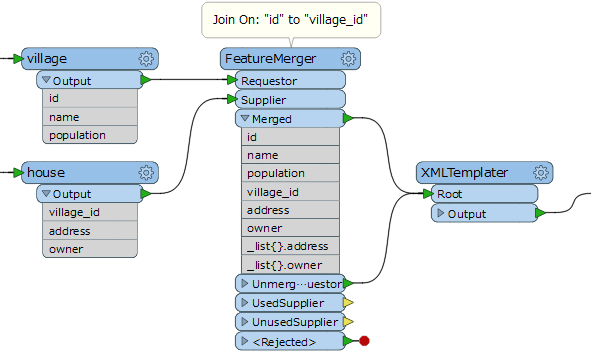I am looking for a way to have a "default value" if there is no data in a subtemplate.
Consider the house, village example from the help documentation. If we have multiple villages with an id, and multiple houses with a village_id, we can set the Root template to
<village>
<name>{fme:get-attribute("name")}</name>
<population>{fme:get-attribute("population")}</population>
<houses>
{fme:process-features("HOUSE", "village_id", fme:get-attribute("id"))}
</houses>
</village>and the correct houses will be associated with the correct village.
and you could end up with an output like
<village>
<name>Anytown, USA</name>
<population>2568</population>
<houses>
<house>
<address>123 Main Street</address>
<owner>John Doe</owner>
</house>
<house>
<address>324 Main Street</address>
<owner>Jane Doe</owner>
</house>
</houses>
</village>However if there are no houses for a specific village, the result is
<village>
<name>Anytown, USA</name>
<population>2568</population>
<houses>
</houses>
</village>Something like
<village>
<name>Anytown, USA</name>
<population>2568</population>
<houses>No houses available</houses>
</village>
In my data the root feature (village) has no information as to the number of subfeatures (houses) associated with it, so I can't simply use a conditional like
<houses>
{ if( (fme:get-attribute("housecount") eq "0") )
then {fme:process-features("HOUSE", "village_id", fme:get-attribute("id"))}
else "No houses available"
}
</houses>Any thoughts? I have several thousand root features and several hundred thousand subfeatures so I would like to avoid using a featureMerger on the data prior to the XMLTemplater if at all possible.






